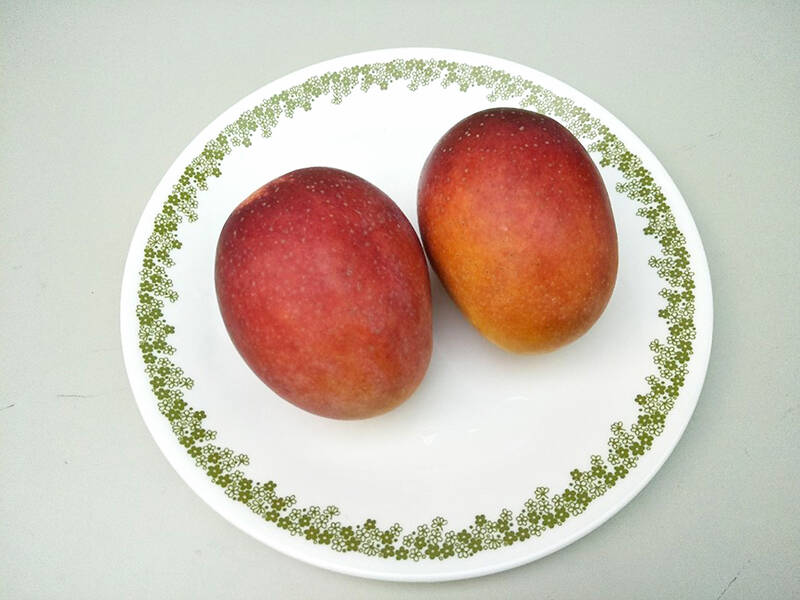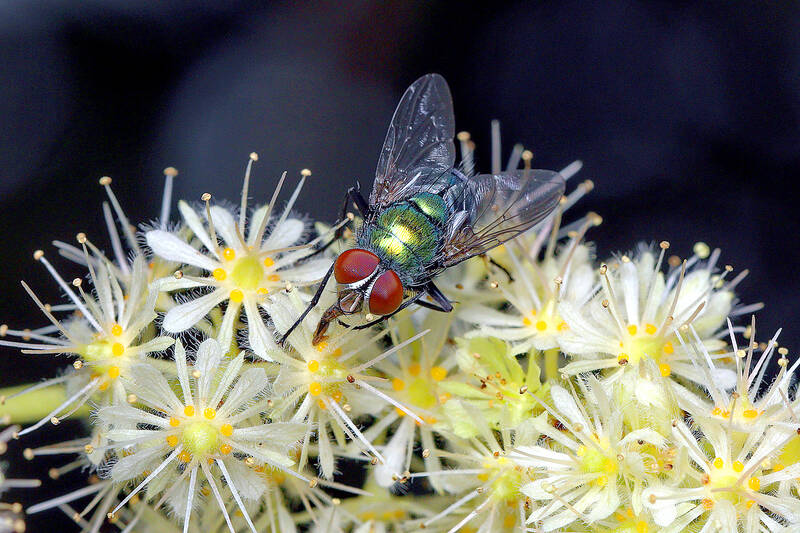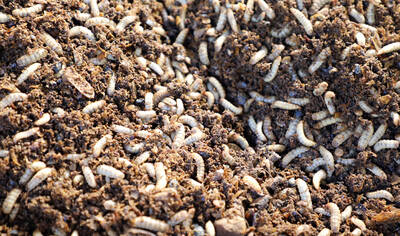The Dutch introduced the Indian mango (Mangifera indica) to Taiwan in the 17th century. It is a green-skinned mango with thick fibers that get stuck in the teeth, but it boasts a rich aroma and a unique taste.
In 1954, Taiwan’s Council of Agriculture introduced several mango cultivars from Florida, USA, including the Irwin, Haden, and Keitt varieties. After seven years of testing and domestication, the Irwin variety was chosen for promotion. Years later, the sample saplings started to bear fruit. These mangoes were large, with thin, vibrant red peels and golden pulp. The Irwin mangoes were mouth-wateringly sweet and earned the nickname “apple mangoes.”
In the late 1960s, many Irwin mango trees in the Tainan area were exhibiting an alarming phenomenon—they would flower but not bear fruit. A pollinated Irwin mango weighs between 300 and 400 grams, but many mango flowers/blossoms weren’t being pollinated, leaving a majority of trees fruitless. The Council of Agriculture formed a task force to address the crisis, but even after a decade had passed, their efforts remained unsuccessful.

Photo: Bookman l 圖片:書林提供
One day, in 1987, Professor Lin Tzong-Shyan noticed a pig’s head discarded in a mango orchard. The rotting flesh had attracted hordes of blowflies, which could be seen buzzing around several nearby trees. Realizing that an abundance of fruit hung from these trees, Lin Tzong-Shyan began connecting the dots. Could blowflies be the answer?
During the mango flowering season of 1988, Lin Tzong-Shyan convinced a farmer named Wu Ching-Chin to conduct an experiment: to attract blowflies, a pile of rotten fish or poultry viscera was placed beneath every eighth mango tree. A few months later, Wu had a bountiful harvest of mangoes—several times greater than those of previous years. The problem that had confounded Taiwan’s Council of Agriculture for so long had finally been solved, and Taiwan’s mango output skyrocketed thereafter!
夏天是愛文芒果盛產的季節,台灣原有的土芒果 (Mangifera indica) 是17世紀荷蘭時期引進,台語稱為「檨仔」(su?inn),果小皮綠、肉少纖維多,但有特殊風味。

Photo: Bookman l 圖片:書林提供
1954年,農復會自美國佛羅里達州引進愛文 (Irwin)、海頓 (Haden)、肯特(Kent)、凱特 (Keitt) 等栽培種 (cultivar),經過7年試種馴化,選出最適合台灣的愛文種推廣。愛文芒果皮紅肉黃,香氣濃,外表像紅蘋果一樣,所以當時又稱「蘋果檨」。
但在1960年代末期,台南地區芒果樹大量出現開花不結果的現象,原本授粉成功的果實可達三四百公克,但若沒授粉,就無法結果,或只結如雞蛋大小的無子芒果。農政單位邀集果樹專家深入研究,經十餘年,依然未能解決。有農藝專家認為南部春季乾旱、水分不足,造成芒果不結果。台大園藝系林宗賢教授受命參與研究,進行試驗,結果加強灌水的果樹,無子芒果反而變多,推翻「水分不足造成芒果不結果」的假說。
1987年,有一回林教授在玉井鄉間看到居民將酬神建醮過後發臭的豬頭丟棄在芒果樹下,吸引了大群俗稱金蒼蠅的麗蠅 (blowfly),注意到這些飛舞的蒼蠅附近的芒果樹都結實累累,不禁聯想,這可能是解決「開花不結果」的救星。於是林教授說服果農吳清進配合實驗,1988年芒果開花期間,在每八棵芒果樹中間放一堆發臭魚雜、內臟,麗蠅嗅覺非常靈敏,果園一有腐肉味,它們就會聞風而至,順帶也為芒果授粉。幾個月後芒果採收,每公頃產量達為過去的許多倍,困擾十多年的芒果開花不結果問題,終於找到解決方法。在芒果開花期間誘引麗蠅,現已成為臺灣果園量產愛文芒果的秘密武器。
今天我們有香甜可口又平價的愛文芒果可吃,應當感謝玉井農民鄭罕池的無私,台大林宗賢教授發現的秘密武器—麗蠅。
文章由書林出版公司提供:
www.bookman.com.tw
蘇正隆 — 台灣翻譯學學會前理事長、師大翻譯研究所兼任副教授; 編著《走讀自然.花言樹語》,《英語的對與錯》,《世紀病毒:必讀防疫英文知識與詞彙》...等。國家教育研究院中英雙語詞彙審議委員;研究領域為翻譯、術語及詞典編譯,從事植物與人文導覽數十年,亦曾應邀遠赴國外大學做植物人文導覽。

A: Apart from the Taipei Music Center’s exhibit and concert, US pop rock band OneRepublic and rapper Doja Cat are touring Kaohsiung this weekend. B: OneRepublic is so popular that after tonight’s show at the K-Arena, they are set to return to Taiwan again in March next year. A: And Doja will also perform at the same venue on Sunday, right? B: Yup. Her collab with Blackpink’s Lisa and singer Raye for the song “Born Again” has been a huge worldwide success. A: Doja even made it on Time magazine’s “100 Most Influential People” list in 2023. She’s so cool. A: 本週末除了北流的特展和演唱會外,美國男團共和世代和饒舌歌手蜜桃貓朵佳也將來台開唱。 B: 共和世代因太受歡迎,繼今晚高雄巨蛋的演唱會後,預計明年3月即將再度來台巡演唷。 A: 朵佳本週日將在同場地開唱,對不對?

Just like fingerprints, your breathing patterns may serve as a definitive identifier. In a recent study, scientists have demonstrated an astonishing 96.8% accuracy in identifying individuals based on their respiratory patterns. This revelation could open up new possibilities in biometrics and personalized health monitoring. The notion of using individual breathing patterns as a distinct biological signature has long been a topic of discussion within the respiratory science community, yet a practical method for measurement remained elusive. This changed with the invention of a tiny, wearable device capable of extended recording. Researchers deployed a lightweight tube designed to fit inside

In most cities, food waste is often regarded as one of the most troublesome types of waste: it has a high moisture content, spoils easily and produces strong odors. If not handled properly, it can cause serious sanitation and environmental problems. From the perspective of the circular economy, however, food waste is not “useless leftovers,” but rather an organic resource that has yet to be effectively utilized. The core principle of the circular economy is to break away from the linear model of “production–consumption–disposal,” allowing resources to circulate repeatedly within a system and extending their useful life. Food waste occupies a

Continued from yesterday(延續自昨日) The study also uncovered a correlation between breathing patterns and mental well-being. Participants with higher scores on anxiety questionnaires exhibited shorter inhalation periods and more frequent breath pauses during sleep. “We intuitively assume that how depressed or anxious you are changes the way you breathe,” says one researcher involved in the study. “But it might be the other way around.” If this proves true, then training people to adjust their breathing may offer a novel approach to managing conditions like anxiety or depression. 該項研究也揭露了呼吸模式與心理健康之間的關聯。在焦慮問卷得分較高的受試者於睡眠期間表現出的吸氣時間較為短促、呼吸中止更為頻繁。一位參與研究的學者表示:「我們直覺地認為憂鬱或焦慮的程度會改變你的呼吸方式,但有可能是反過來的情況。」如果這一假設得到證實,那麼訓練人們調整呼吸的方式,可能會成為管理焦慮或憂鬱等疾病的新穎方法。 What Did You Learn? 1. What problem did scientists previously face when trying to measure breathing patterns? 2.